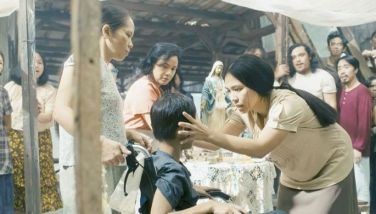Leo’s way of improving the industry
October 31, 2004 | 12:00am
If there’s another word to describe Leo Martinez aside from funny and irreverent, it’s outspoken. The man doesn’t resort to guessing games. He tells it like it is — sans embellishments and throat-clearing.
He feels so passionate about the industry it hurts when he sees it disgraced in the hands of the irresponsible and indifferent. That’s why, as director general of the Film Academy of the Philippines (FAP), Leo is not just sitting on his swivel chair and twiddling his thumbs. He has come up with measures to help the industry.
One of them will require foreign filmmakers coming to the Philippines to shoot a film to register with the FAP first. No work permit, no shooting.
This system, Leo points out, will not only make things easier for the film outfit. It will also minimize and hopefully get rid of "bootlegged" films being made here sans without permit.
The measure will benefit not only the film industry but local tourism, which can guide foreign filmmakers on where to go and showcase the best the country has to offer.
Leo drew inspiration from a similar ruling, this time for foreign singers visiting the country. And he hopes the success of the said system for foreign singers will be replicated in the film industry.
But he’s not stopping there. Leo’s other present for the industry that has been good to him is a proposal for a student film festival, first in Metro Manila, and then in the provinces.
"The goal," he reveals, "is to push local culture and with it, the students’ appreciation of its beauty. All films should be based on original literature written by a Filipino. It will not be a commercial type of filmfest. The products of the project can be shown in schools, foreign embassies, consulates, etc."
He is now talking to Quezon City Vice Mayor Herbert Bautista so the project can kick off in his area in time for the Linggo ng Wika celebration in August 2005. Leo is keeping his fingers crossed the project will spread to key cities in Visayas and Mindanao after its Metro Manila run.
"This time, you don’t have to worry about piracy," says Leo. "The films will be distributed in schools, embassies and consulates."
If he’s thinking more along cultural lines these days, it’s because Leo was named UNESCO Commissioner on Culture and it’s his job to promote the country’s culture among foreigners.
"I want to change the ugly picture the world has of the Philippines. All these talk shows speak of rumors and the latest scandals, not to mention news that just talks about crimes, graft, corruption and terrorism," he observes.
His way of fighting this bad image is through his Pride Campaign, which aims to rekindle Filipinos’ sense of nationalism by reminding them what’s good about the country. One of this good things, Leo says, is our culture. There is so much to learn from say, Bernardo Carpio, whose story has been forgotten with the advent of Spiderman and other foreign superheroes.
Leo knows he’s fighting windmills. But he’s so used to doing this by now he doesn’t mind it anymore. When he became as FAP Director General for instance, Leo knew he had a lot of cleaning up to do. The voting system attracted criticism and undermined FAP’s credibility at that time.
So he overhauled the awards process, creating groups called citers, nominators and voters who followed clear, quantifiable judging parameters, with the help of AIM (Asian Institute of Management) professors. Then, he handed over the awards ceremonies itself to Albert Martinez, who put up a dazzling show, ala Oscars, complete with red carpet, designer outfits and jewelry for the stars. The awards rites was the talk of the town days after it was held.
"We have proven it can be done, and we’re expecting bigger awards rites next year," Leo says with pride.
But how come all the long hours and the endless meetings don’t show on Leo’s unlined face?
"You can examine my hair," he says, holding a tuft of unruly bangs up for everyone to see. "I don’t dye them."
"At 49 going on 50 in March, he has (only) seven strands of white hair," wife Gina Valenciano-Martinez attests.
The secret?
"Simple. I don’t bottle things up. I express what I feel. If you break up the Stimulus-Affect-Response-Effect Cycle (SARE), things can get tough. So I don’t," he replies.
That, folks, is another lesson, this time on looking younger from a man who has fought batttles and prevailed.
He feels so passionate about the industry it hurts when he sees it disgraced in the hands of the irresponsible and indifferent. That’s why, as director general of the Film Academy of the Philippines (FAP), Leo is not just sitting on his swivel chair and twiddling his thumbs. He has come up with measures to help the industry.
One of them will require foreign filmmakers coming to the Philippines to shoot a film to register with the FAP first. No work permit, no shooting.
This system, Leo points out, will not only make things easier for the film outfit. It will also minimize and hopefully get rid of "bootlegged" films being made here sans without permit.
The measure will benefit not only the film industry but local tourism, which can guide foreign filmmakers on where to go and showcase the best the country has to offer.
Leo drew inspiration from a similar ruling, this time for foreign singers visiting the country. And he hopes the success of the said system for foreign singers will be replicated in the film industry.
But he’s not stopping there. Leo’s other present for the industry that has been good to him is a proposal for a student film festival, first in Metro Manila, and then in the provinces.
"The goal," he reveals, "is to push local culture and with it, the students’ appreciation of its beauty. All films should be based on original literature written by a Filipino. It will not be a commercial type of filmfest. The products of the project can be shown in schools, foreign embassies, consulates, etc."
He is now talking to Quezon City Vice Mayor Herbert Bautista so the project can kick off in his area in time for the Linggo ng Wika celebration in August 2005. Leo is keeping his fingers crossed the project will spread to key cities in Visayas and Mindanao after its Metro Manila run.
"This time, you don’t have to worry about piracy," says Leo. "The films will be distributed in schools, embassies and consulates."
If he’s thinking more along cultural lines these days, it’s because Leo was named UNESCO Commissioner on Culture and it’s his job to promote the country’s culture among foreigners.
"I want to change the ugly picture the world has of the Philippines. All these talk shows speak of rumors and the latest scandals, not to mention news that just talks about crimes, graft, corruption and terrorism," he observes.
His way of fighting this bad image is through his Pride Campaign, which aims to rekindle Filipinos’ sense of nationalism by reminding them what’s good about the country. One of this good things, Leo says, is our culture. There is so much to learn from say, Bernardo Carpio, whose story has been forgotten with the advent of Spiderman and other foreign superheroes.
Leo knows he’s fighting windmills. But he’s so used to doing this by now he doesn’t mind it anymore. When he became as FAP Director General for instance, Leo knew he had a lot of cleaning up to do. The voting system attracted criticism and undermined FAP’s credibility at that time.
So he overhauled the awards process, creating groups called citers, nominators and voters who followed clear, quantifiable judging parameters, with the help of AIM (Asian Institute of Management) professors. Then, he handed over the awards ceremonies itself to Albert Martinez, who put up a dazzling show, ala Oscars, complete with red carpet, designer outfits and jewelry for the stars. The awards rites was the talk of the town days after it was held.
"We have proven it can be done, and we’re expecting bigger awards rites next year," Leo says with pride.
But how come all the long hours and the endless meetings don’t show on Leo’s unlined face?
"You can examine my hair," he says, holding a tuft of unruly bangs up for everyone to see. "I don’t dye them."
"At 49 going on 50 in March, he has (only) seven strands of white hair," wife Gina Valenciano-Martinez attests.
The secret?
"Simple. I don’t bottle things up. I express what I feel. If you break up the Stimulus-Affect-Response-Effect Cycle (SARE), things can get tough. So I don’t," he replies.
That, folks, is another lesson, this time on looking younger from a man who has fought batttles and prevailed.
BrandSpace Articles
<
>
- Latest
- Trending
Trending
Latest
Trending
Latest
Recommended




















 Exclusive
Exclusive











